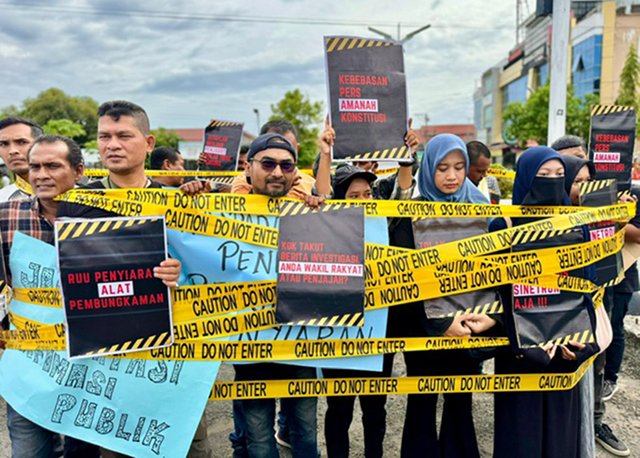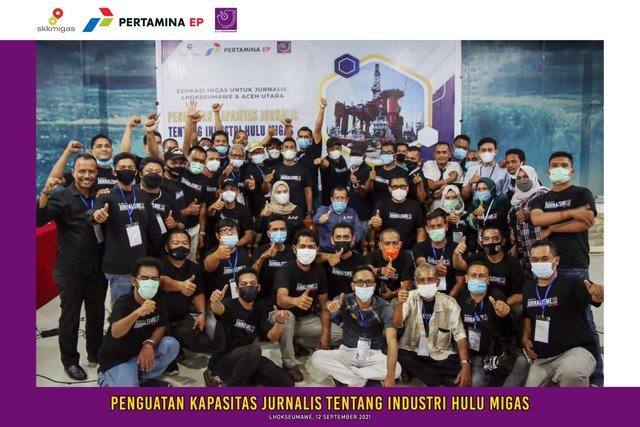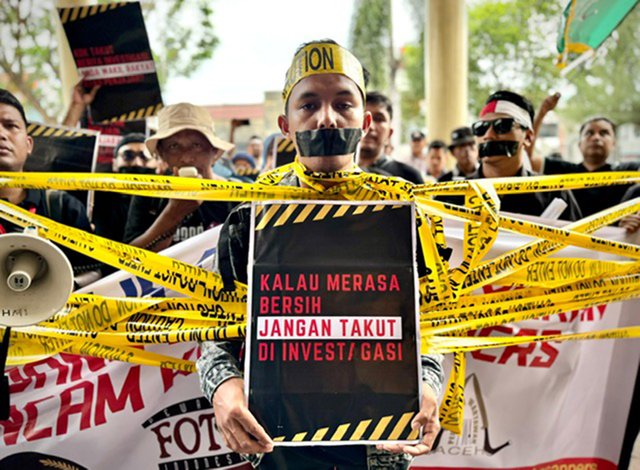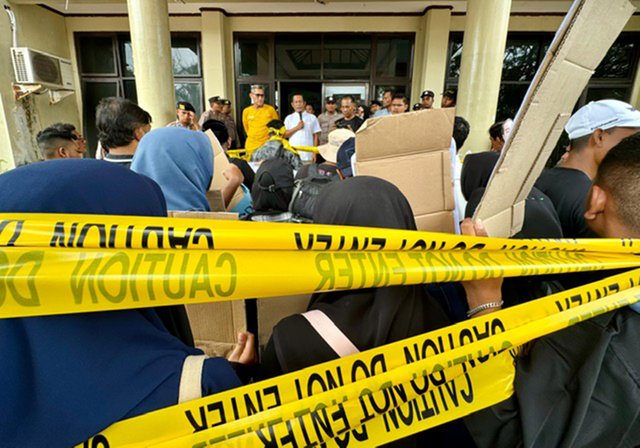La resiliencia de los sistemas de seguridad de los medios digitales | Resilience of Digital Media Security Systems |

Manifestación por la libertad de prensa en Aceh, Indonesia.
El sitio de noticias suara.com sufrió un ciberataque y no se pudo acceder a él recientemente. Este caso suele aparecer en los medios online y tiene diversos efectos secundarios. No son sólo los medios de comunicación relacionados los que sufren pérdidas, sino también la comunidad en general que accede a la información y al conocimiento a través de un portal de noticias.
Además, los anunciantes también sufren pérdidas, especialmente si el ataque no puede recuperarse durante mucho tiempo. Es aún peor si hay actividades promocionales que están ligadas al tiempo con ofertas especiales, como descuentos, promociones por tiempo limitado o actividades al aire libre.
Estos formatos de anuncios crean urgencia para los consumidores y socios potenciales. Sin embargo, como el portal estuvo inaccesible durante mucho tiempo, los consumidores y los anunciantes se vieron perjudicados.
El incidente vivido por suara.com podría ocurrirle a cualquier medio, como le ocurrió a Tempo hace un tiempo. Por lo tanto, la amenaza de este ataque debe anticiparse desde el principio y todos los medios en línea deben tener un sistema de prevención, disuasión y respuesta que sea rápido, reactivo y medible.
Diversas fuentes indican que los motivos de los ataques podrían variar. En primer lugar, existen motivos económicos, como pedir a los medios de comunicación en cuestión una determinada cantidad de dinero.
Sin embargo, si los ataques se producen contra medios de comunicación de menor alcance, ciertamente no es por motivos económicos. Este caso con motivos económicos ha sido catalogado como delito cibernético.
Otro motivo es el deseo de los hackers de probar sus habilidades. Simplemente estaban probando sus habilidades hackeando un portal.
Este incidente recuerda a los propietarios y equipos de medios que los desafíos que enfrentan los medios en línea en la era digital no son sólo un gobierno represivo, sino que son más complejos y complicados.
Por último, también hay ataques debidos al contenido de los medios de comunicación en cuestión. El contenido de las noticias puede resultar perturbador para ciertas partes aunque no exista ninguna violación de normas ni códigos éticos.
En distintos grados, sea cual sea el motivo, amenaza la libertad de prensa y perjudica el derecho del público a obtener información.
Los ataques a los medios de comunicación masivos son ataques a la libertad de expresión y a la democracia. Los medios de comunicación masivos bombean información a todas las venas de la sociedad, dando espacio a voces que han sido marginadas, así como a las críticas a gobiernos corruptos.
La existencia de esta amenaza recuerda a la tripulación la necesidad crítica de un sistema de seguridad digital confiable. Dado que implica tecnología digital e inteligencia artificial, se requieren recursos para asignarla.
Aquí es donde se necesita la solidaridad entre las empresas de medios para contrarrestar los ataques digitales invisibles. Se espera al menos que las empresas de medios de alta tecnología compartan información sobre las formas de ataques y amenazas a los sistemas de seguridad de los medios masivos.
En una situación como ésta, las consideraciones de competencia en el negocio de los medios masivos ya no son un obstáculo para la sinergia y la colaboración. Cuanto más sofisticada se vuelve la tecnología digital, más sofisticado es el sistema de seguridad necesario. Y éste es un enemigo común de la libertad de prensa.[]

Capacitación sobre petróleo y gas para periodistas en Indonesia.
Resilience of Digital Media Security Systems
The news site suara.com experienced a cyber attack that made it inaccessible, not long ago. This case often hits online media with various side effects. Not only the related media that suffers losses, but also the wider community who access information and knowledge from a news portal.
In addition, advertisers also suffer losses, especially if the attack cannot be recovered for a long time. Even worse if there are promotional activities that are tied to time with special offers, such as discounts, time-limited promotions, or outdoor activities.
Such advertising formats create urgency for potential consumers and partners. However, because the portal cannot be accessed for a long time, consumers and advertisers are harmed.
The incident experienced by suara.com could happen to any media, such as what Tempo experienced some time ago. So, the threat of this attack must be anticipated from the start and all online media must have a prevention, deterrence, and response system that is fast, responsive, and measurable.
Various sources state that the motives for the attack can vary. First, there are economic motives such as asking for money from the media concerned.
However, if the attack occurs against media with a smaller scope, it is certainly not for economic reasons. Cases with economic motives are already categorized as cybercrime.
Another motive is the hacker's mischief in testing their abilities. They only try their ability to hack a portal.
This incident reminds media owners and crews that the challenges of online media in the digital era are not only repressive governments, but are more complex and complicated.
Finally, there are also attacks due to the content of the media concerned. The content of the news may be considered disturbing to certain parties even though there are no violations in terms of regulations and codes of ethics.
To varying degrees, whatever the motive, it has threatened press freedom and harmed the public's rights to obtain information.
Attacks on the mass media are attacks on freedom of opinion and democracy. The mass media pumps information into all the veins of society, giving space to voices that have been marginalized, as well as criticism of corrupt governments.
The existence of this threat reminds the crew of the critical need for a reliable digital security system. Because this involves digital technology and artificial intelligence, it requires resources to allocate it.
This is where solidarity among media companies is needed to ward off invisible digital attacks. Media companies with high technology are at least expected to share information about the form of attacks and their threats to the mass media security system.
In a situation like this, considerations of mass media business competition are no longer an obstacle to synergy and collaboration. The more sophisticated digital technology, the more sophisticated the security system needed. And this is a common enemy for press freedom.[]


Hola amigo recuerda que debes usar imágenes propias o también puedes usar imágenes colocando el link en la parte de abajo de donde fueron tomadas.
Saludos 👍🇻🇪